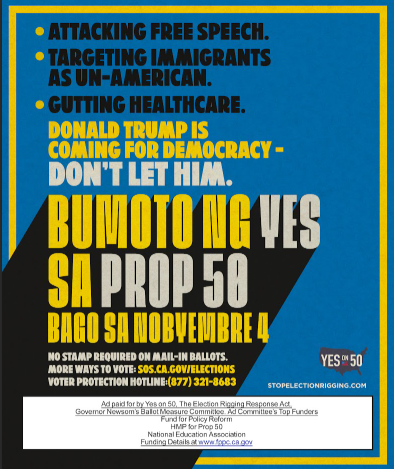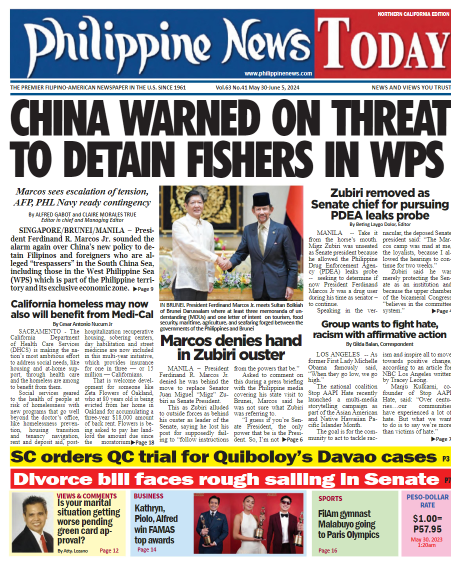VP SARA, 3 EX-PRESIDENTS OUT FROM NATIONAL SECURITY COUNCIL; Worsens Marcos-Duterte rift; reorg hit, defended
By ALFRED GABOT and CLAIRE MORALES TRUE
Editor in Chief and Managing Editor
MANILA — President Ferdinand Marcos Jr. has issued an executive order (EO) which removed the vice president and former presidents from the National Security Council (NSC), widening further the rift between the President and Vice President Sara Duterte.
Aside from the Vice President, former presidents, including her father Rodrigo Duterte, and her family’s ally Gloria Macapagal Arroyo, and Joseph Estrada, were among those removed from the NSC, the principal advisory body on national security and foreign policy matters.
Malacanang and the NSC leaders themselves immediately defended the re-organization under EO 81, saying the Chief Executive has the authority to do so. (See related stories)
This as former chief presidential legal counsel Salvador Panelo blasted President Marcos for removing Vice President Duterte and three former presidents in the revamped NSC.
In a statement, Panelo, who also served as Malacanang spokesperson during the administration of President Rodrigo Duterte, said that “[t]he removal of VP Sara as member of the National Security Council is an ill advised presidential move.”
“It smacks of dirty politics. Another brazen measure to diminish the political star power of VP Sara,” Panelo said.
On the removal of former presidents in the NSC, Panelo said the move was meant to “deodorize the elimination of VP Sara as member — to make it appear that she is not being targeted.“
Executive Secretary Lucas Bersamin defended the reorganization, saying the Vice President is ”not considered relevant to the responsibilities of membership in the NSC.”
Bersamin said the President has the power to add members to the composition of the NSC as needed.
It is “malicious” to claim that the reorganization of the NSC is a prelude to martial law, Bersamin added.
Former presidential spokesperson Harry Roque earlier alluded that President Marcos J is eyeing a military rule, following the removal of the Vice President and the past Philippine presidents as members of the NSC.
“Kung iniisip mo iyan lagi (If you are always thinking that way), that’s malicious. The Constitution is very clear when may a President declare martial law. I don’t think it’s in the mind of the President right now,” Bersamin said in a Malacanang Palace press briefing.
“What he has in his mind is the economic prosperity of the country, the health and welfare of the people, especially those of the lower classes, and the prioritization of his legacy projects. The President accepts that as the number one concern. It’s not about martial law. It’s not about extending himself. No, he has no thinking about that. He does not even think in those terms,” Bersamin added.
Bersamin said Panelo “has no moral authority to question the decision” of Marcos, stressing that the former Palace official also advocated to exclude then Vice President Leni Robredo from the NSC under the term of former president Rodrigo Duterte.
He also stressed that Marcos, having the power of absolute reorganization, “can choose the people he listens to or he would listen to.”
“Look at it this way, the National Security Council is an advisory body and this is an advisory body in relation to the President as the commander-in-chief so the President has the right, as well as the responsibility of seeing to it that whoever advises him is within his fullest trust and confidence,” he said.
“I’m not saying that the Vice President does not anymore deserve to be trusted. But I’m just saying that with the recent development, it is not going to be good advice or good action on the President to still have her on board,” Bersamin added.
National Security Adviser (NSA) Eduardo Año described President Marcos Jr.’s Executive Order No. 81as a necessary move to further enhance the formulation of policies affecting national security.
“The NSC is, first and foremost, an advisory body to the President, and its composition is always subject to the authority of President,” Ano said.
Año, who is also NSC Director General, said Administrative Code of 1987 vests the Chief Executive with the continuing authority to reorganize the administrative structure of the Office of the President which the agency is a part of.
“Moreover, Section 17, Article VII of the Constitution vests in the President the power of control over all executive departments, bureaus and offices,” he added.
Año also pointed out that previous Chief Executives have reorganized the composition of the NSC to meet the President’s requirements and changing conditions.
EO 81, titled “Reorganizing the National Security Council,” was actually signed on Dec. 30, 2024, but was only released to the media on January 3.
Ironically, under EO 81, the membership of the NSC was expanded with several Congressional leaders and Cabinet members, making it unwieldy. The members now are the President as Chairperson; Senate President, Speaker of the House of Representatives, Senate President Pro-Tempore, 3 Deputy Speakers to be designated by the Speaker, Majority Floor Leader of the Senate, Majority Floor Leader of the House, Minority Floor Leader of the Senate, Minority Floor Leader of the House, Chairperson, Senate Committee on Foreign Relations; Chairperson, Senate Committee on National Defense and Security, Peace, Unification and Reconciliation; Chairperson, Senate Committee on Public Order and Dangerous Drugs; Chairperson, House Committee on Foreign Affairs; Chairperson, House Committee on National Defense and Security; Chairperson, House Committee on Public Order and Safety; Executive Secretary, National Security Adviser; Secretary, Department of Foreign Affairs; Secretary, Department of Justice; Secretary, Department of National Defense; Secretary, Department of the Interior and Local Government; Secretary, Department of Labor and Employment; Chief Presidential Legal Counsel; Secretary, Presidential Communications Office; Head, Presidential Legislative Liaison Office; and such other government officials and private citizens as the President may appoint or designate from time to time.
Under former President Gloria Macapagal-Arroyo’s EO 34, Series of 2001, which re-organized the NSC, the vice president and former presidents were members of the NSC.
Also, the position of presidential spokesperson, which was included in Arroyo’s NSC, has been phased out in Marcos’ administration and replaced by the Secretary of the Presidential Communications Office.
Arroyo’s EO also designated Deputy Speakers from Luzon, Visayas, and Mindanao as members of the NSC. However, under Marcos’ EO, the House Speaker is now tasked with designating the deputy speakers who will be included in the NSC.
VP Duterte earlier questioned Marcos and the NSC for not inviting her to the NSC meetings, despite being a member of the council.
The Vice President’s relationship with the Marcos administration soured throughout 2024.
VP Duterte publicly issued a death threat against Marcos when she claimed to have spoken to a contract hitman to kill Marcos, the First Lady and House Speaker if she were to be killed.
The Vice President clarified that her remark against President Marcos, First Lady Liza Araneta Marcos, and Romualdez was not a threat but only highlighting the supposed threat against her security.
The NSC, however, condemned Duterte’s remarks as a threat to national security. The National Bureau of Investigation is currently conducting an investigation into her comments.
President Elpidio Quirino on July 1, 1950, created the NSC through Executive Order No. 330, with only ten officials as members:
- President,
- the Vice President,
- the President of the Senate,
- the Speaker of the House of Representatives,
- the Head of each Executive Department,
- the Chairman of the Committee on the Army, Navy, and Military Pensions of the Senate,
- the Chairman of the National Defense Committee of the House of Representatives,
- the Commanding General of the Armed Forces of the Philippines, and
- the Chairman of the Philippine Veterans Board.
Meanwhile, 41 percent of Filipinos support the impeachment of Vice President Duterte if recent Social Weather Stations (SWS) survey is to be believed.
The SWS survey, conducted from Dec. 12 to 18, 2024 and commissioned by Stratbase Consultancy, also revealed that 35 percent opposed Duterte’s ouster, and 19 percent were undecided.


















